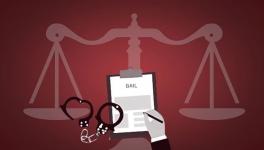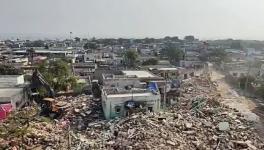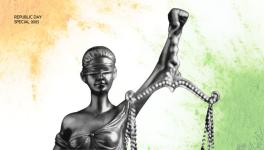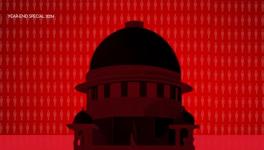“NALSA Showed that the Mindset of the Court is Changing”- Laxmi Tripathi
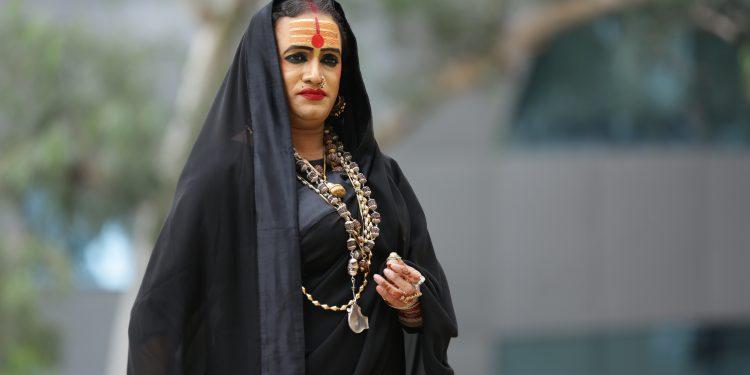
September 6, 2020, marks the second anniversary of the landmark Supreme Court judgment Navtej Singh Johar v Union of India. From Naz Foundation to Kaushal to Navtej, the journey to freedom faced its highs and lows. The fight persevered and won this battle of love. The Leaflet’s Special: Two Years since Navtej Johar case describes the journeys that led to the Navtej Johar case, and the journeys after it. Laxmi Tripathi, leading transgender activist, speaks to Megha Katheria of The Leaflet about how S 377 and NALSA judgments played a crucial role in the empowerment of the community, and the way forward in the future.
——–
What was your reaction when the NALSA case was filed?
When NALSA was filed, the community was supposed to be a part of it but NALSA went alone to the court. There was a lot of politics happening at the time. I tend to keep away from that. But during the proceedings, there was nothing spoken about the traditional Hizra Kinner community. The real sense of what we wanted to do we could not do. Then Anand Grover called me up and asked me what should be done? Then I replied that we should represent. That’s how the Lawyers Collective came in between and broke the story of the traditional Hizra community. In the last section, we came together. When my intervention was given in the court it changed a lot of things. The intervention was one of the landmark events in the judgment; when the community intervened. The judgment mentions my name right from the first page.
I believe that everything takes time and of course, you cannot blame the judiciary. You cannot blame anybody. The blame is on the education system and the blame is on us that we were not able to do proper advocacy.
What motivated you to file the intervention application back then?
First, it was the politics that were going around which made me file it and the second is Anand Grover who motivated me to file it. He told me that the traditional community issues were not being spoken of. And I have been associated with the Lawyers Collective for ages. Indira and Anand Grover supported me to understand the judiciary very well and the issue of rights. I am a commerce student and we don’t know these things. We don’t read these about law and nothing is taught in schools that what is my constitutional right and what are my rights as a person in this country. We don’t know much about these things. “Upar Upar ka hamein pata rehta hai na ” but I got to know many things from Anand and Lawyers Collective a lot. It inspired me to speak up. We can’t sit at home quietly. So, when I came to know about the rights situation, then we went ahead. Then one essay about my book Me Hizra Me Lakshmi was submitted by Anand to the court. It is my biography that includes the atrocities I faced as a child in schools and colleges.
First, it was the politics that were going around which made me file it and the second is Anand Grover who motivated me to file it.
When Naz Foundation first filed the case against Section 377 there was not much talk going around about Section 377. How did you see the things unfolding after the petition?
We started the whole activism. I was one of the faces of Section 377 movement. In 2000 when this activism began, we were all there. And Lawyers Collective played the most important role in that and NAZ Foundation went ahead and we were all proud of it. Anjali Gopalan and all, we were all very proud of them. We were happy. When Justice A.P. Shah gave the judgment, it was a remarkable judgment. But then came the dark ages for few years. But the Supreme court again decided to hear us and that brought Navtej into existence. It was a wonderful thing.
How did the community react to the Koushal Judgment and what was the period between Koushal and Navtej like?
The biggest thing for us is that people came out and everything was normal. And suddenly they had to go back inside the closets and which was not possible so there were lot of atrocities and lot of blackmailing and people became suicidal. The worst thing was people were blackmailed and many children took their lives. This was really sad. It was given to us and taken away.
When Naz was first filed in 2009, the Delhi HC dismissed the petition. What are your views on that?
I believe that everything takes time and of course, you cannot blame the judiciary. You cannot blame anybody. The blame is on the education system and the blame is on us that we were not able to do proper advocacy. But then we all came together. So much of advocacy work was done by Lawyers Collective and many organisations who went ahead to do this whole advocacy.
NALSA showed that the mindset of the court is changing. So many things became that way.
When Navtej Johar was pronounced how did you and your community react to that judgment?
The whole thing changed. People were safe again by the law and the respect and dignity was given back to every individual immaterial to their choices and everything.
At least there is something whereas for 74 years there was nothing. We have to work with the government and it is immaterial which government it is.
What are your views on the Transgender Act and the rules formulated therein? What impact do you see now and foresee in the coming future?
There may be some problems but I believe that at least there is something in black and white now. Nothing is 100 percent right or wrong isn’t it? We have to work with government at least the government which is being criticised so much by the social activists and the so called left thinkers and whatever it is. I don’t want to get into all this left and right. I don’t understand it. But there is something, when Navtej happened it was the BJP government, transgender bill and policy and transgender council was also during the BJP.
You are on the Transgender Council. How do you think that will shape up? Do you think it will be the protector and facilitator of the transgender persons’ rights?
The Council’s responsibility is to see how we can take and use certain things to create a space of understanding between the bureaucracy and the issue of rights trickle down to the common people who actually require it. Instead of having nothing we actually have something now. Something is better than nothing.
Protection of rights of transgender persons is the duty I believe and that is the duty of the state welfare boards also. What do we criticise it? You tell me? At least there is something whereas for 74 years there was nothing. We have to work with the government and it is immaterial which government it is.
(The Leaflet thanks Jithendra Palepu for his assistance in the writing of this report.)
Originally Published in The Leaflet
Get the latest reports & analysis with people's perspective on Protests, movements & deep analytical videos, discussions of the current affairs in your Telegram app. Subscribe to NewsClick's Telegram channel & get Real-Time updates on stories, as they get published on our website.









